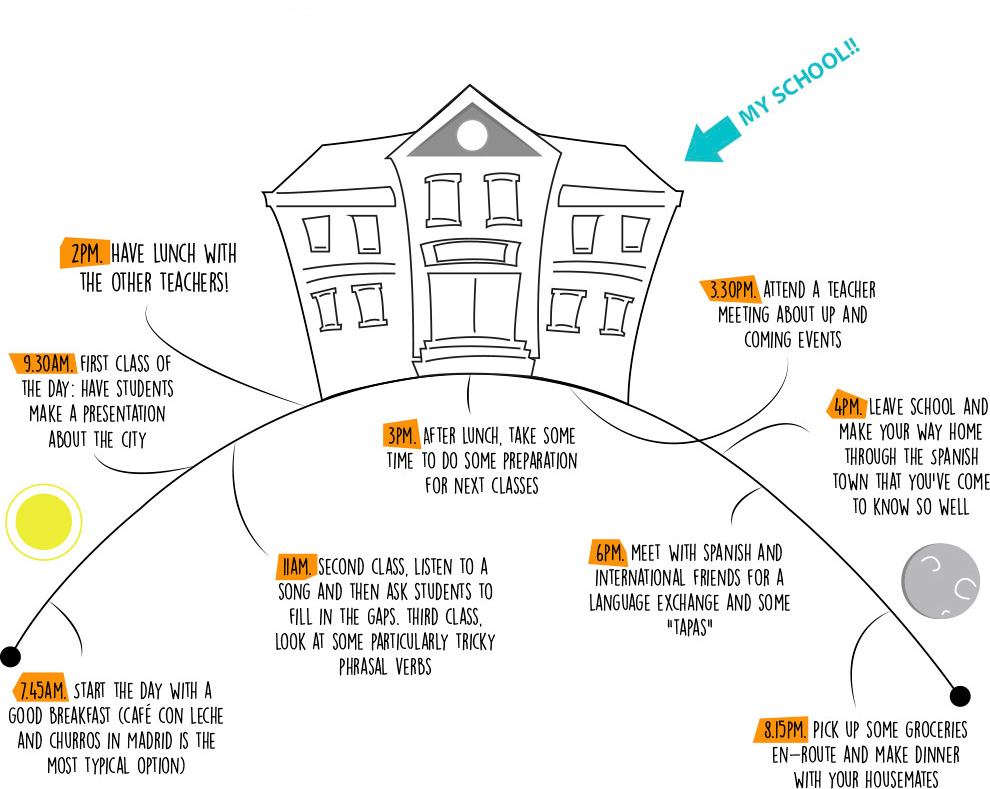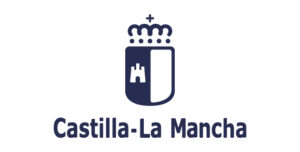Teach
English
Become an Auxiliar de Conversación in Spain
ConversaSpain Auxiliares de Conversación Programs
What Is an Auxiliar de Conversación?
Auxiliares de Conversación are proficient English speakers who are willing to teach at schools, and eager to experience first-hand the Spanish culture, lifestyle, and language.
As an Auxiliar de Conversación, you will have a very active role in supporting the main teacher and helping students improve their English conversation skills. You will teach English to students who are in primary school, middle school, or high school. However, you will not be responsible for grading or disciplining them.
At ConversaSpain, we want students to have the chance to understand your country while you also understand ours. Teach kids the English language, tell them about your culture, broaden their horizons, open doors for them… and let doors be opened for you as well!
What Is the Role of an Auxiliar de Conversación?
Activities and classes will vary daily and will depend on the specific requirements of the school.
Teach English to students for 14, 15, or 16 teaching hours per week spread over 4 weekdays.
Help to prepare lessons and assist teachers in the classroom.
Give short presentations and prepare engaging games and activities.
Collaborate in different subjects such as Physical Education or Social Science if needed (you do not need to be an expert in those subjects, as it will still be focused on English conversation).
Prepare students for oral exams.
Speak to students in English at all times (Spanish will not be allowed in class).
Show initiative, autonomy, and professional behavior.
Show a keen interest in students' progress.
Motivate students to learn English and encourage interest in the culture and traditions of your own country.
Participate in departmental meetings.
Take part in conversation classes with teachers who are willing to improve their English.
Arrive to the class on time and follow the timetable.
Arrange to coordinate with the main English teacher to avoid any confusion, confirm expectations, and ask any questions.
Integrate into the school dynamic.
A Day in the Life of an Auxiliar de Conversación
THE AUXI DAY

THE AUXI LIFE
The 25-26 academic year awaits you!
To apply read the Program Information and then fill out the form
Education System in Spain
Participants may be placed in public schools, mainly primary, middle, or high schools. During the application process, candidates are asked for their preferences in terms of region, and age range of the students. While these requests cannot be guaranteed, ConversaSpain takes all requests into consideration.
Unsure about how the Spanish Education System is structured? Let’s dive into what it looks like:
Educación Infantil
In Spain, Educación Infantil is voluntary and it goes from 0 to 5-year-olds. It is usually divided into two different types of schools. Babies and toddlers from 0-3 years old attend escuelas infantiles (nurseries) and kids 3-5 go to colegios (schools). Some schools have different buildings for the youngest with age-adapted facilities.
At the preschool level, songs, music, and games are going to be extremely important. Children are still learning their own language and therefore will learn only the most basic English.
Educación Primaria
Children aged 6 to 12 attend primary school. This educational stage is mandatory. All classes are mixed ability and exams start from around the third year.
One objective in this stage is to acquire the basic communicative competence that will allow them to express and understand simple messages and cope in everyday situations in at least one foreign language.
At this age, students will benefit from a friendly and fun environment. In particular, structure and familiarity but with creative variety in the classroom will keep students happy and engaged.
Educación Secundaria Obligatoria (ESO)
After finishing primary school at 12 years old, in Spain, students must attend secondary school until they are 16 years old. Students take many subjects, some of which are compulsory and others that are optional. Compulsory subjects often include Spanish, Math, History and/or Geography, and a Foreign Language.
Regarding their foreign language competencies, the objective in this stage is that students understand and express themselves in an appropriate manner.
Auxiliares de Conversación should spend time finding out about the student’s interests, hobbies, and preferences in order to fully engage them in class.
Bachillerato
Bachillerato is part of secondary education, but in this stage, 16 to 18-year-old students are choosing to continue with their education. At the end of the bachillerato, most students will take entrance exams for university, while others might choose vocational studies. Students still take a series of core subjects but have to specialize in one particular field of study in order to prepare for higher education.
Auxiliares de Conversación teaching bachillerato students need to incorporate engaging topics and real-life debates into their teaching in order to really push their students to achieve the best results.
Teach English as an Auxiliar de Conversación
Ready to Become an Auxiliar de Conversación?
Read the Program Information and fill out the Form!







